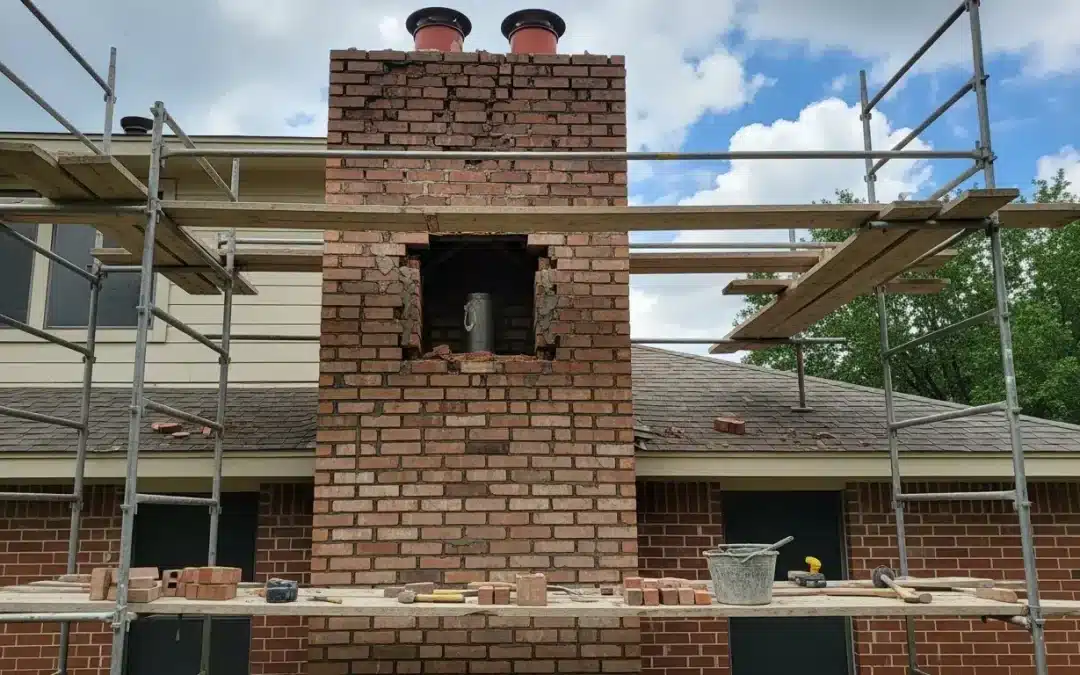Houston homeowners face unique challenges when it comes to maintaining their brick chimneys. The city’s humid subtropical climate, combined with occasional severe weather events, can accelerate the deterioration of masonry structures. Understanding when a brick chimney rebuild in Houston becomes necessary can save homeowners from costly emergency repairs and potential safety hazards.
Signs That Indicate You Need a Brick Chimney Rebuild in Houston
Recognizing the warning signs early can prevent minor issues from escalating into major structural problems requiring a complete brick chimney rebuild in Houston. The Gulf Coast climate creates specific conditions that affect masonry differently than in other regions of the country.
Water damage represents the most common reason for needing a brick chimney rebuild in Houston. The city’s high humidity levels and frequent rainfall can cause mortar joints to deteriorate rapidly. When water penetrates these weakened joints, it can freeze during rare cold snaps, causing the masonry to crack and crumble. Lone Star Chimney professionals regularly encounter situations where homeowners have delayed repairs, ultimately requiring a complete rebuild instead of simple repointing.
Structural settling also plays a significant role in chimney deterioration throughout the Houston area. The expansive clay soils common in Harris County can shift dramatically during wet and dry cycles, placing stress on foundation-supported structures like chimneys. This movement can cause vertical cracks in the brick work, separation from the main structure, or lean in the chimney stack.
Visual Inspection Techniques for Houston Homeowners
Conducting regular visual inspections helps identify problems before they necessitate a full brick chimney rebuild in Houston. Start by examining the chimney from ground level, looking for obvious signs of damage such as missing or loose bricks, white staining (efflorescence), or vegetation growing from mortar joints.
Pay particular attention to the chimney crown and cap, as these components protect the entire structure from water infiltration. Cracks or missing sections in these areas can accelerate deterioration throughout the chimney system. Lone Star Chimney technicians emphasize the importance of addressing crown issues promptly to avoid extensive interior damage.
The flashing where the chimney meets the roof deserves special attention during inspections. Houston’s intense summer heat can cause metal flashing to expand and contract repeatedly, eventually creating gaps that allow water penetration. These seemingly small openings can lead to significant structural damage over time.
Interior Warning Signs That Suggest Rebuilding Needs
Interior indicators often provide the first clues that a brick chimney rebuild in Houston may become necessary. Water stains on walls adjacent to the chimney, particularly after heavy rainfall, suggest that moisture is penetrating the masonry structure. These stains may appear as discoloration, peeling paint, or wallpaper bubbling near the chimney location.
Musty odors emanating from the fireplace, especially during humid weather, indicate moisture problems within the chimney system. This moisture can promote mold growth and accelerate masonry deterioration from the inside out. Lone Star Chimney experts note that addressing these moisture issues early can often prevent the need for complete rebuilding.
White staining or mineral deposits appearing on interior walls near the chimney also signal water infiltration problems. These efflorescence deposits occur when water carries minerals from the masonry to the surface, leaving behind telltale white residue as it evaporates.
Understanding Houston’s Climate Impact on Brick Chimneys
The Houston metropolitan area’s climate presents unique challenges for masonry structures that can accelerate the need for a brick chimney rebuild in Houston. The combination of high humidity, frequent temperature fluctuations, and occasional severe weather creates a perfect storm for masonry deterioration.
Summer temperatures regularly exceed 90 degrees Fahrenheit, causing significant thermal expansion in brick and mortar. When combined with the region’s high humidity levels, this creates conditions where moisture can penetrate small cracks and remain trapped within the masonry structure. The subsequent heating and cooling cycles cause this trapped moisture to expand and contract, gradually widening cracks and weakening the overall structure.
Hurricane season brings additional concerns for Houston area chimneys. High winds can dislodge loose bricks or damage chimney caps and crowns, creating entry points for water infiltration. Even tropical storms that don’t reach hurricane strength can dump several inches of rain in short periods, testing the waterproofing capabilities of aging chimney systems.
Preventive Maintenance to Avoid Premature Rebuilding
Implementing a comprehensive preventive maintenance program can significantly extend the life of a brick chimney and potentially avoid the need for a complete brick chimney rebuild in Houston. Regular maintenance addresses minor issues before they develop into major structural problems.
Annual inspections by qualified professionals help identify developing problems early. Lone Star Chimney recommends scheduling these inspections during the spring months, allowing time to complete necessary repairs before the intense summer heat and potential storm season. These professional assessments can identify issues that homeowners might miss during casual visual inspections.
Prompt repair of minor mortar joint deterioration prevents water infiltration that could necessitate extensive rebuilding. Repointing individual joints costs significantly less than replacing entire sections of masonry. The key lies in addressing these repairs before water penetration causes damage to the interior structure of the chimney.
Professional Assessment and Rebuilding Process for Houston Chimneys
When signs indicate that a brick chimney rebuild in Houston may be necessary, obtaining a professional assessment becomes crucial for making informed decisions. The evaluation process involves comprehensive inspection techniques that go beyond surface-level visual examination.
Qualified chimney professionals use specialized tools to assess the structural integrity of masonry systems. These tools can detect hidden damage within the chimney structure that might not be visible during standard visual inspections. Lone Star Chimney technicians employ moisture meters, borescopes, and other diagnostic equipment to provide accurate assessments of chimney conditions.
The assessment process begins with exterior evaluation of the chimney structure, examining the condition of the brick, mortar joints, crown, and flashing systems. Professionals look for signs of settlement, separation from the main structure, and evidence of previous repair attempts that may have been inadequate or improperly executed.
Interior inspection involves examining the flue lining, smoke chamber, and damper systems. These components play crucial roles in safe chimney operation and may require replacement during a brick chimney rebuild in Houston. Damaged flue linings can allow dangerous gases to escape into living spaces, making their replacement a safety priority.
The structural evaluation determines whether partial repairs can address identified problems or if complete rebuilding offers the most cost-effective long-term solution. Lone Star Chimney professionals consider factors such as the extent of damage, the age of the existing structure, and the homeowner’s long-term plans for the property when making recommendations.
Material Selection for Houston Climate Conditions
Selecting appropriate materials for a brick chimney rebuild in Houston requires understanding how different products perform in the local climate conditions. The choice of brick, mortar, and waterproofing materials can significantly impact the longevity and performance of the rebuilt chimney.
Brick selection involves more than aesthetic considerations. Different brick types offer varying levels of absorption and freeze-thaw resistance. While Houston rarely experiences freezing temperatures, the occasional cold snap combined with moisture-saturated masonry can cause damage. Choosing low-absorption brick varieties helps prevent moisture-related problems.
Mortar composition plays a critical role in the long-term performance of rebuilt chimneys. Modern mortar formulations designed for humid climates include additives that improve water resistance and flexibility. These enhanced mortars better accommodate the thermal expansion and contraction cycles common in Houston’s climate.
Flashing materials must withstand Houston’s intense heat and UV exposure. Copper and stainless steel options provide superior longevity compared to galvanized steel or aluminum alternatives. Proper flashing installation during a brick chimney rebuild in Houston prevents water infiltration that could undermine the new masonry work.
Waterproofing treatments specifically formulated for masonry applications help protect rebuilt chimneys from moisture infiltration. Lone Star Chimney professionals apply these treatments during the construction process, creating an additional barrier against Houston’s humid conditions while allowing the masonry to breathe naturally.
Timing Considerations for Houston Chimney Rebuilding Projects
Scheduling a brick chimney rebuild in Houston requires careful consideration of weather patterns and seasonal factors that could impact the construction process. The timing of rebuilding projects can affect both the quality of work and the overall project duration.
Spring months typically offer the most favorable conditions for masonry work in the Houston area. Moderate temperatures and lower humidity levels create ideal conditions for mortar curing and brick installation. Completing rebuilding projects during spring also ensures the chimney is ready for occasional winter use and prepared for the challenging summer weather ahead.
Summer rebuilding projects face challenges from extreme heat and afternoon thunderstorms. High temperatures can cause mortar to cure too rapidly, potentially affecting the strength of joints. However, experienced contractors like Lone Star Chimney have techniques for working safely and effectively during hot weather when necessary.
Hurricane season considerations may influence project timing for homeowners planning a brick chimney rebuild in Houston. Completing major structural work before peak storm season reduces the risk of weather-related construction delays and protects the investment in rebuilding work.
Winter projects, while less common in Houston, can be viable during mild periods. The reduced humidity and cooler temperatures can actually benefit certain aspects of masonry work, though contractors must monitor weather forecasts carefully to avoid rain delays.
Building Codes and Permit Requirements in Houston
Understanding local building codes and permit requirements becomes essential when planning a brick chimney rebuild in Houston. The City of Houston and Harris County maintain specific regulations governing chimney construction and rebuilding projects.
Permit requirements typically apply to major rebuilding projects that involve structural modifications or complete reconstruction. Minor repairs may not require permits, but substantial rebuilding work generally does. Lone Star Chimney stays current with local code requirements and can guide homeowners through the permit application process.
Houston building codes specify requirements for chimney height, clearances from combustible materials, and flue sizing relative to fireplace dimensions. These codes ensure safe operation and proper draft characteristics for rebuilt chimneys. Compliance with current codes may require modifications to existing designs during rebuilding projects.
Foundation requirements for rebuilt chimneys must meet current structural standards. Existing foundations may require reinforcement or complete replacement to support new masonry construction properly. These considerations factor into the overall scope and timeline of brick chimney rebuild projects in Houston.
Fire safety codes govern the installation of flue linings, spark arrestors, and chimney caps. Modern rebuilding projects must incorporate these safety features even if they were absent from the original construction. Lone Star Chimney ensures all rebuilt chimneys meet current fire safety standards.
Investment Value of Professional Chimney Rebuilding
A properly executed brick chimney rebuild in Houston represents a significant investment in property value and safety. Understanding the long-term benefits helps homeowners make informed decisions about rebuilding versus continued repairs of deteriorating structures.
Property value considerations include both the functional improvement and aesthetic enhancement that rebuilding provides. A well-built chimney adds to curb appeal and demonstrates proper maintenance to potential buyers. Real estate professionals often note that homes with recently rebuilt chimneys command higher selling prices compared to properties with obviously deteriorated chimney systems.
Safety improvements from rebuilding extend beyond the immediate fire hazard reduction. Properly functioning chimneys prevent carbon monoxide intrusion, structural damage from water infiltration, and potential collapse hazards from severely deteriorated masonry. These safety enhancements protect both the property investment and family welfare.
Energy efficiency benefits result from improved draft characteristics and proper sealing of rebuilt chimney systems. Lone Star Chimney incorporates modern insulation and sealing techniques during rebuilding projects, reducing energy loss through the chimney structure when fireplaces are not in use.
Long-term maintenance costs typically decrease following professional rebuilding compared to continuing repairs on deteriorating structures. While the initial investment in a brick chimney rebuild in Houston may seem substantial, the reduced frequency of repair needs and improved performance often justify the expense over time.
Insurance considerations may also favor rebuilding over continued repairs. Some insurance policies provide better coverage for homes with recently updated structural components, including professionally rebuilt chimneys. Additionally, proper rebuilding can eliminate existing conditions that might otherwise lead to coverage exclusions.
Maintenance After Rebuilding Your Houston Chimney
Implementing proper maintenance practices following a brick chimney rebuild in Houston ensures maximum return on the rebuilding investment. Professional rebuilding provides an opportunity to start fresh with a comprehensive maintenance program designed for local climate conditions.
Regular cleaning schedules become particularly important for rebuilt chimneys that will see active use. Annual professional cleaning removes creosote deposits and allows for inspection of the rebuilt components. Lone Star Chimney recommends scheduling cleaning services during spring months to prepare for occasional winter use and identify any issues that may have developed.
Waterproofing maintenance involves periodic application of masonry sealers designed for Houston’s climate conditions. These treatments typically require renewal every few years, depending on exposure conditions and product specifications. Regular waterproofing maintenance protects the investment in rebuilding work and extends the service life of new masonry.
Crown and cap maintenance focuses on these critical components that protect the entire chimney system. Regular inspection and prompt repair of minor crown cracks prevents water infiltration that could damage the rebuilt masonry structure. Cap maintenance includes ensuring proper screen installation and verifying that drainage systems function correctly.
Flashing inspection should occur annually, particularly after severe weather events. Houston’s climate can cause metal flashing to expand and contract significantly, potentially creating gaps that allow water penetration. Early detection and repair of flashing issues protects the rebuilt chimney from water damage.
Professional inspection schedules help identify developing issues before they compromise the rebuilt structure. Annual inspections by qualified technicians provide peace of mind and help maintain warranty coverage on rebuilding work. These inspections can catch problems early when repairs remain simple and inexpensive.
Selecting Qualified Contractors for Your Houston Chimney Project
Choosing the right contractor for a brick chimney rebuild in Houston requires careful evaluation of qualifications, experience, and local knowledge. The quality of rebuilding work directly impacts both safety and long-term performance of the chimney system.
Licensing verification ensures contractors meet minimum qualification standards for masonry and chimney work. Houston area contractors should maintain appropriate state and local licenses for the scope of work involved in chimney rebuilding. Lone Star Chimney maintains all required licensing and stays current with continuing education requirements.
Insurance coverage protects homeowners from liability during rebuilding projects. Contractors should carry both general liability and workers’ compensation insurance appropriate for the scope of chimney rebuilding work. Verification of insurance coverage provides important protection for property owners.
Experience with Houston climate conditions becomes crucial for successful rebuilding projects. Contractors familiar with local weather patterns, soil conditions, and building code requirements can anticipate challenges and incorporate appropriate solutions into rebuilding designs.
References from previous customers provide insight into contractor reliability and work quality. Speaking with homeowners who have completed similar brick chimney rebuild projects in Houston offers valuable perspective on what to expect during the construction process.
Material sourcing capabilities affect both project timing and quality outcomes. Established contractors maintain relationships with suppliers who stock appropriate materials for Houston climate conditions. This ensures project schedules remain on track and materials meet local performance requirements.
Warranty provisions demonstrate contractor confidence in their rebuilding work and provide protection for the homeowner’s investment. Comprehensive warranties should cover both materials and workmanship for reasonable periods following project completion. Lone Star Chimney stands behind their rebuilding work with substantial warranty coverage that reflects their commitment to quality construction.


